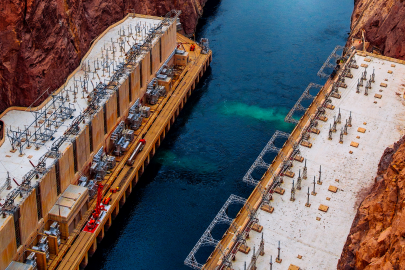WPTO is working harder to protect, understand, and leverage the immense power and promise of the ocean.
Water Power Technologies Office
June 15, 2021The Earth’s oceans connect the world in a way that no other natural resource does; they play a critical role in our livelihoods and environment by sustaining cultures, communities, and ecosystems. During National Ocean Month, the U.S. Department of Energy's (DOE's) Water Power Technologies Office (WPTO) celebrates the connection our oceans foster among all life on Earth, along with the power potential we have yet to discover.
Photo by Deb Lastowka, NREL
With oceans covering 71% of the planet, WPTO is diving even deeper into those waters, working to protect, understand, and leverage the immense renewable energy found in the ocean. Marine energy resources are geographically diverse and can complement existing energy sources, with the potential to provide power for 50% of the U.S. population living within 50 miles of the shoreline. From building resilient coastal communities to providing power at sea, WPTO is enabling energy innovation that is entirely transforming marine energy.
As part of WPTO’s trailblazing efforts, the Powering the Blue Economy™ initiative aims to explore how to sustainably use ocean energy to power ocean-observing devices, offshore aquaculture, and remote or islanded communities, thereby improving livelihoods, creating jobs, and building economic growth—all while preserving ocean ecosystems. By supporting the ingenuity and creativity of innovators nationwide, we can all better understand and sustain the beauty and life in our oceans.
To help achieve our collective economic, social, and environmental goals, WPTO is calling on problem solvers across the United States to help address complex issues. By leveraging prizes and competitions as unique and accessible funding mechanisms, WPTO is uniting a diverse community of innovators around targeted challenges. These prize models support competitors from all walks of life, empowering them to tackle climate change, spur the transition to a sustainable and equitable clean energy economy, and propel the creation of new jobs and opportunities.
Powering the Blue Economy prizes and competitions highlights:
Ocean Observing Prize
WPTO has partnered with the National Oceanic and Atmospheric Administration’s (NOAA’s) Integrated Ocean Observing System Office to develop the Ocean Observing Prize. WPTO is counting on innovators, entrepreneurs, and academics across the country to create technologies that integrate marine renewable energy with ocean-observing platforms to help improve the ability to forecast hurricane intensity and protect coastal communities from incoming storms. The end goal is to find solutions that will ultimately close data gaps and revolutionize the ability to collect the information needed to understand, map, and monitor the ocean. In April, NOAA and DOE announced seven winners of the DESIGN Contest—the first of three consecutive contests in the prize’s DEVELOP Competition. The competitors are now participating in the BUILD Contest—the second of the three contests, in which each team will build and test their devices in a state-of-the-art wave tank at the U.S. Navy’s Maneuvering and Seakeeping Basin in Carderock, Maryland, in early 2022.
Waves to Water Prize
The wave of innovation doesn’t end there. In February, DOE announced 10 winners in the ADAPT stage of the Waves to Water Prize, a five-stage, $3.3-million competition focused on using the power of waves to develop clean-energy-powered desalination technologies. The contest aims to accelerate innovation in small, modular, wave-powered desalination systems capable of producing clean water in disaster recovery scenarios and for water-scarce coastal and island locations. WPTO has called on a diverse group of entrepreneurs, academics, hardware developers, and inventors to take part in the ground-breaking effort to spark innovation in desalination and marine renewable energy technologies.
Marine Energy Collegiate Competition
As our nation begins to address the problems associated with climate change, WPTO understands that the perseverance and insight of the next generation is key to building a modern and sustainable infrastructure. This year, WPTO hosted the second annual Marine Energy Collegiate Competition, which called on university students to help transform the marine energy industry and, ultimately, advance the blue economy. Fifteen competing teams offered diverse and creative solutions to unlock the power of our oceans, rivers, and tides, and the National Renewable Energy Laboratory and WPTO were thrilled to announce three collegiate teams as overall winners of the 2021 Marine Energy Collegiate Competition. With designs spanning wave-powered desalination systems to energy storage and transfer technologies at sea, the winning teams demonstrated the vast potential of blue economy applications.
Throughout June, WPTO honors National Ocean Month by celebrating the many ideas, people, communities, and collaborations that our powerful ocean brings together. While we still have much to learn from the waves, tides, and currents, it’s no secret that our life-sustaining oceans are a boundless source of inspiration and opportunity.
Learn more about WPTO’s efforts that focus on supporting communities and marine life while advancing the blue economy.
Stay up to date with WPTO prizes and competitions. Sign up for the Water Wire and WPTO STEM newsletters to hear the latest news.
Jennifer Garson

Jennifer is the Director of the Water Power Technologies Office at the U.S. Department of Energy, where she leads the office’s strategy, management, and execution of the $150M office. The Water Power Technologies Office advances research, development and demonstration of hydropower and marine renewable energy. For the last three years, she has led some of the office’s key activities and initiatives—like the Powering the Blue Economy initiative—and a portfolio of prizes, interagency grants, among other programs. She has focused on increasing the impact of federal funding for supporting innovation, including leveraging nontraditional financial mechanisms. This includes increasing the utilization of prizes, creative lab-directed funding, SBIR/STTRs, and other competitive solicitations. Over the last decade, she has worked across DOE, the federal government, and in partnership with the private sector to launch and create new programs, prizes, and commercialization approaches for blue economy and cleantech technologies and applications.
Prior to the Water Office, she was the Chief of Staff for the Deputy Assistant Secretary for Renewable Power in the Office of Energy Efficiency and Renewable Energy. She was previously a Senior Advisor for the U.S. Department of Energy Office of Technology Transitions, focused on Department-wide strategies for increasing the use of prizes, challenges, and other open innovation tools. She also focused on catalyzing new networks and prizes to help entrepreneurs move their technologies from research institutions into the market in the Office of Energy Efficiency and Renewable Energy Technology to Market team. Her programs supported hundreds of startups across the country through novel training programs, competitions targeted at university students, challenges linking solutions to major corporate partners, supporting early-stage pilots helping validate companies' technologies, and creating new national and regional networks.
She served as a policy and market analyst in the Office of the Chief Financial Officer, developed analysis and provided technical assistance for the Office of Electricity Delivery and Energy Reliability on their smart grid portfolio during the Recovery Act, and served as a research assistant for a private consulting company.
Jennifer earned her B.A. in Anthropology and Environmental Studies Concentration at Kenyon College and her Master of Public Policy at George Washington University.
Articles by Jennifer Garson
-
 This National Hydropower Day, explore ways WPTO is helping build cleaner communities and making important contributions toward the United States’ goals of achieving a carbon-free electricity sector by 2035 and net-zero-emissions economy by 2050.
This National Hydropower Day, explore ways WPTO is helping build cleaner communities and making important contributions toward the United States’ goals of achieving a carbon-free electricity sector by 2035 and net-zero-emissions economy by 2050. -
 WPTO Director Jennifer Garson discusses WPTO’s investments in efforts led by industry, academia, and our national laboratories to advance our understanding and development of water power systems and technologies.
WPTO Director Jennifer Garson discusses WPTO’s investments in efforts led by industry, academia, and our national laboratories to advance our understanding and development of water power systems and technologies. -
 Water Power Technologies Office (WPTO) Director Jennifer Garson presents the 2020-2021 WPTO Accomplishments Report, which highlights achievements from WPTO-supported research across its Hydropower and Marine Energy programs.
Water Power Technologies Office (WPTO) Director Jennifer Garson presents the 2020-2021 WPTO Accomplishments Report, which highlights achievements from WPTO-supported research across its Hydropower and Marine Energy programs. -
WPTO is working harder to protect, understand, and leverage the immense power and promise of the ocean.
-
The Cleantech University Prize Collegiate Competition has traveled coast-to-coast over the past four months to find America’s next clean energy entrepreneurs. Meet the teams that will compete for $100,000 in prizes at the National Competition this we...
-
Energy Department competition supports student entrepreneurs and helps spur development of new clean energy technologies.
-
The Cleantech University Prize recently made two stops along the Interstate 95 corridor, with regional competitions in New Jersey and Boston. With just two regional competitions remaining, Cleantech UP teams are inching closer to the national competiti...
-
Forty-two companies with promising energy and other cutting-edge technologies collected more than $1.69 million at the 2016 Rice Business Plan Competition in Houston, Texas, capping an annual event billed as the world’s richest and largest graduate-l...
-
NovoMoto, a student-led startup from the University of Wisconsin-Madison, took home $50,000 after winning the Energy Department's Cleantech University Prize regional competition at the annual Clean Energy Trust Challenge in Chicago. NovoMoto's MicroPla...
-
The Energy Department's Cleantech University Prize competition traveled to the campus of Carnegie Mellon University in Pittsburgh for the first-eve...
-
Heating and air conditioning -- an $11 billion industry in America -- accounts for 5% of domestic energy use.

